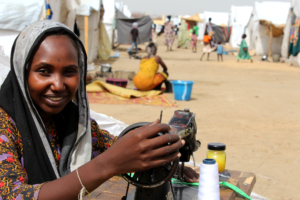5 Innovations in Poverty Eradication in Chad

Chad is a land-locked country with sporadic rain patterns and regular droughts, but it has not given up its hope of ending poverty. With a population of approximately 15.5 million people, 66.2% of the population live in severe poverty with little access to clean water, healthcare and education. However, this has not stopped the Government of Chad or partnering organizations from aiding in the country’s advancement. Here are five innovations in poverty eradication in Chad.
5 Innovations in Poverty Eradication in Chad
- Bharti Airtel: This telecommunication company has operations in 20 countries in Africa and Asia. It has made it its mission to invest in human capital in Africa, proposing that tech training and literacy are key in African economic development and that they can open doors for knowledge and education that can empower the younger generation. Over 6,000 people will benefit from the ICT training programs Airtel is implementing in Chad.
- ResEau Project: The ResEau Project is making great advances in aiding the reduction of water scarcity in Chad. In Chad, 57.5% of the population lacks access to basic water services. Additionally, only 6% of citizens receive water from unsafe open sources such as rivers. The ResEau Project is working with the Swiss Agency for Development and Cooperation and the Government of Chad to create 3D models and map well sites and other water sources. Since the ResEau Project started working in Chad, the success rate for water drilling has gone from 30% up to 60%.
- Chad Education Sector Reform Project (PARSET): The Chad Education Sector Reform Project has been working on providing primary education to children. It has built and supplied 500 schools and trained over 13,000 teachers. In addition, the program has improved the rate of children attending school from 87% to 96%. It has taught upwards of 20,000 children to read and write, and about 60% of the students are girls. Moreover, many children have struggled to have access to education as most of the population is displaced and their families need them at home to help provide water and other necessities. The project started in 2013 and will continue through the fall of 2020.
- Emergency Agriculture Production Support Project: In this project, The United Nations Food and Agriculture Organization (FAO) and World Food Program (WFP) are providing food vouchers and nutritional supplements for malnourished children. Chad faces major food scarcity due to frequent drought, lack of access to social services and the effects of regional conflict. In 2020 alone, approximately 1.8 million children 5 years old and younger will suffer from malnutrition. The
agricultural production and livestock stabilization component of this project has provided over 30,000 households with agricultural equipment, seeds and fertilizer. Over 10,000 households received training in production techniques and more modern agricultural technologies. - Gavi The Vaccine Alliance: The Gavi Vaccine Alliance has provided vaccines to countries in poverty for years, preventing over 13 million deaths. The Gavi Vaccine Alliance has frequently partnered with leading organizations such as the Bill and Melinda Gates Foundation, the World Bank, the World Health Organization, developing countries, vaccine manufacturers, private sector partners and research agencies to provide vaccinations against debilitating and deadly diseases. The Gavi Vaccine Alliance provides vaccines for measles, pneumonia, typhoid, cholera, rotavirus, yellow fever, hepatitis B and tetanus among several others. As the organization continued its
work in Chad, difficulties arose with nomadic peoples with the organizations’ conventional outreach and vaccine opportunities. In fact, only 3% of children in Batha are receiving basic vaccinations. Gavi started a “One Health” approach to this and has seen great results. The program vaccinates children and animals in one setting. Additionally, at the same time, the program tries to provide convenience and efficiency to the nomadic peoples.
Chad is working hard to lift its people out of poverty. This is evident in its unique approaches in important areas such as agriculture and livestock, education and technology access, life-saving vaccines and access to clean water. Increasing access to education and technological literacy along with high child vaccination rates in several areas should heavily aid in bringing a generation out of poverty. In addition, they should have opportunities in their adult lives to continue to work on even more innovations to further the success of their country.
– Madalyn Wright
Photo: Flickr
